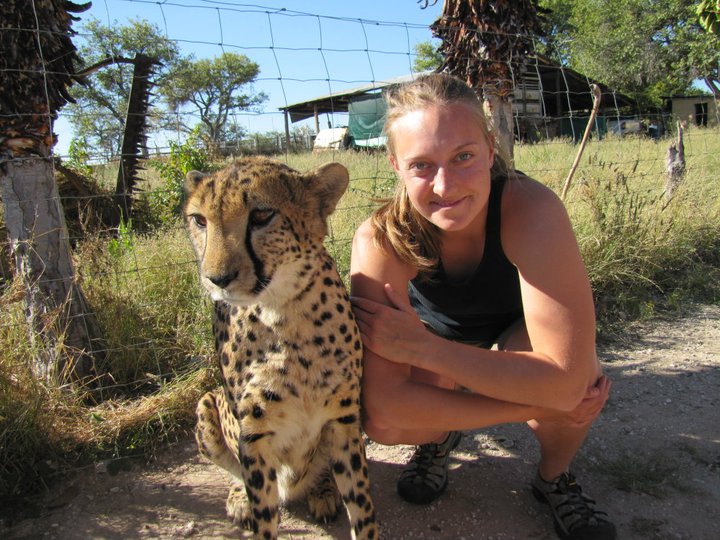
For as long as she can remember, Katherine Lawry has always held a curious fascination for water and just about everything that lives and thrives in it. The 23-year-old graduate student spent most of her childhood splashing in puddles, streams, rivers, quarries and wherever else she could find water.
"My dad would strap a life jacket on me and be like, 'Okay, there you go,'" said Lawry, who just wrapped up her first semester of graduate studies at the School of Natural Resources at UNL.
As long as she was snugly tucked into her blue life jacket — and escorted by her dog, Cinder, an imposing mix of wolf and German shepherd — she was free to pedal wherever her flaming orange bicycle could take her.
Lawry, who completed her undergraduate degree in fisheries and wildlife at SNR in May 2012, found ways to expand her range beyond the limits of her single-speed bike pedals.
While still an undergraduate, Lawry pieced together a patchwork of scholarships and grants totaling nearly $23,000 — a windfall that helped pay for exotic research and study-abroad programs to places like the Republic of Trinidad and Tobago and southwest Africa's Namibia.
Lawry said the volume of scholarship opportunities was among the principal reasons she switched majors from biology in Arts and Sciences to fisheries and wildlife at SNR.
"Having those outside scholarships," she said, "and really being able to take advantage of those at SNR has definitely allowed me to have opportunities I may not have been able to afford otherwise."
Lawry's academic career may have begun when she first enrolled at the University of Nebraska at Omaha, but the roots go back further — back to those days on her bike, with Cinder at her side.
"I've known her a long time," said Rick Stasiak, a biology professor at UNO for more than 40 years. "I ran into her fishing at a sand pit lake where she grew up. She always seemed to be out there."
The two eventually developed a friendship, and by her junior year of high school she was working with Stasiak in the Hutton Junior Fisheries Biology Program, a summer mentoring program sponsored by the American Fisheries Society.
"That was the tipping point," she said. "I knew for sure it was going to be fish and aquatic stuff after that."
As an undergraduate at UNL, Lawry worked in Trinidad alongside graduate students and UNL's Steve Thomas, associate professor of stream ecology, on "The Guppy Project." The Guppy Project, or Frontiers in Integrative Biological Research, is an experimental program out of the University of California-Riverside and partnered with UNL.
Lawry investigated how land-dwelling insects such as ants and other critters can be a regular part of stream-dwelling fish diets. Lawry said a small portion of insects might fall from trees, but not nearly enough to explain the surprisingly large amounts of terrestrial insects found in fish guts. Her research, funded by grants from UNL's Undergraduate Creativity and Research Experienc, examined the possibility that storm run-off sweeps them into streams.
"How cool, you know, to be just an undergrad and getting to go to Trinidad and do a full scale project, and rubbing elbows with Ph.D. students from Cornell?" Lawry said. "The opportunities are here, you just have to find them."
Lawry's graduate research will be part of a larger biodiversity research project based at Colorado State University, EVOTRAC. Partnered with UNL, and in collaboration with graduate students at Cornell University, EVOTRAC studies the impacts of climate change on biodiversity by examining the ecology of streams in Colorado and Ecuador.
Although the project primarily focuses on insects and amphibians, Lawry said she will add a fish component. Advised by UNL's Steve Thomas, Lawry's master thesis will focus on native fish populations in high-elevation Andes streams.
"She's going to have a lot of experience under her belt by the time she gets her masters," said UNO's Stasiak. "A lot more than I did, that's for sure…That can happen if you let it. And in her case, she's right on the cutting edge."
— Charlie Litton, School of Natural Resources